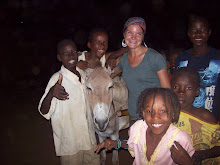This past week I had my first experience in taking a “Bush Taxi” into the city. On the way to Maradi, my team of three was joined by a dozen other Hausa men, women and children in the back of a truck. We shared raisins and orange tictacs (which they confused for medicine) with everyone and they attempted to teach us a few words in Hausa. It was a good exchange!! In Maradi we get to swim in the private club, eat fries, drink cold beverages, use internet service, and go to the post office, bakery and grocery store. I always feel spoiled and but I am very thankful every time I jump into that pool!
Life in Ly On Kara was a bit slower and even hotter this week. We took a map of the world around the village as we went to visit the different compounds. Many people were shocked to see how many places existed in the world. They couldn’t comprehend the existence of so many continents and large bodies of water because many people only know their own village and have only traveled as far as they can walk in one day. We taught the children that the earth is round and that we had to take several airplanes to travel from America to get to Niger. They were excited and amazed to learn about this.
We visited Toda, another Fulani village that is located several kilometers down the road. They wanted Brittany to look at one of the children there who had been severely burnt by a hot mixture of milk and millet. It was a little baby girl, about one year old, who kept trying to crawl even though she had 2nd and 3rd degree burns all over her legs and feet. Even though Brittany is a paramedic in the States, she has more medical training than most of the doctors here in Niger! She helped clean the wounds, put antibacterial ointment on them and then bandaged the legs. Then we instructed her family how to care for the wounds each day until they heal. We will be bringing them more medical supplies each day when we check on the baby.
Ramadan ends next Tuesday and every village will be celebrating in their own fashion. Ly On Kara will be no exception!!! The chief and his children have promised to show us Fulani songs, dances and games when they break their fast on that night! After Ramadan, my team will focus more in the upcoming weeks on teaching English and health/ hygiene lessons in the village. There are also several people interested in hearing stories from the Bible.


